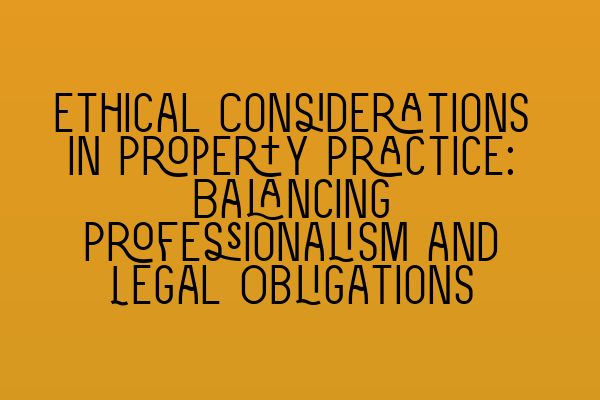Ethical Considerations in Property Practice: Balancing Professionalism and Legal Obligations
As a solicitor practicing property law, it is crucial to navigate the complex landscape of ethical considerations. The property market is a vital aspect of our economy, and clients rely on legal professionals to guide them through various transactions and disputes. However, alongside our professional duties, we must also uphold high ethical standards to protect the interests of all parties involved. In this blog post, we will explore the importance of balancing professionalism and legal obligations in property practice and the ethical considerations that shape our decision-making process.
One of the key ethical considerations in property practice is ensuring client confidentiality. When clients seek legal advice or engage our services, they place their trust in our ability to safeguard their sensitive information. Confidentiality forms the cornerstone of the solicitor-client relationship, and it is our duty to keep our clients’ information confidential, unless disclosure is required or permitted by law.
However, confidentiality should also be balanced with transparency. In property transactions, it is essential to disclose all relevant information to clients, even if it may be detrimental to their interests. By providing comprehensive and accurate advice, we fulfill our ethical duty to act in the best interests of our clients and maintain their trust in our services.
Another ethical consideration is ensuring that all property transactions are conducted diligently and with integrity. This involves conducting thorough due diligence to assess the legality and viability of a transaction, ensuring compliance with all applicable laws and regulations. Diligence also extends to our obligations to third parties, such as ensuring proper communication and negotiation with opposing counsel, avoiding conflicts of interest, and working towards fair and just outcomes for all parties involved.
Furthermore, solicitors practicing property law must acknowledge the impact of their actions on the wider community and environment. Sustainable development and responsible land use have become increasingly important in recent years. As legal professionals, we have a responsibility to advise clients on the ethical implications of their property-related decisions. This may include considerations such as environmental impact assessments, promoting energy efficiency in buildings, and encouraging sustainable development practices.
In addition to these ethical considerations, it is essential to stay informed about any changes in property law and regulations. Keeping up with legal updates and developments allows us to provide accurate advice and representation to our clients. It also ensures that we are fulfilling our duty to maintain our competence as legal professionals.
Balancing professionalism and legal obligations requires constant self-reflection and self-improvement. It is crucial to participate in ongoing professional development and training, such as the SQE 1 and SQE 2 preparation courses offered by SQE Property Law & Land Law. These courses provide the necessary knowledge and skills to navigate the ethical challenges in property practice and ensure compliance with the Solicitors Regulation Authority guidelines.
In conclusion, ethical considerations play a vital role in property practice. As solicitors, we must maintain client confidentiality, act diligently and with integrity, consider the wider community and environment, and stay informed about legal developments. Balancing professionalism and legal obligations is essential to ensure the highest standards of service in the property industry. By integrating these values into our practice, we can continue to uphold the trust and confidence of our clients while contributing to the ethical growth and sustainability of the property market.
Related Articles:
– SQE 1 Practice Exam Questions
– SQE 1 Practice Mocks FLK1 FLK2
– SQE 2 Preparation Courses
– SQE 1 Preparation Courses
– SRA SQE Exam Dates
